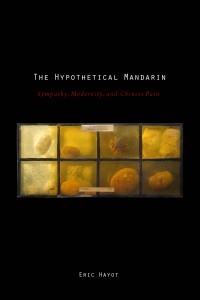This summer I wrote a preface to the Chinese translation of The Hypothetical Mandarin. I figure it will never see the light in English unless I put it online, so I’m putting it here. One thing I noticed is that beginning with the second paragraph my sentences begin to reflect an awareness that my translator is going to have to get them into Chinese. I also am more candid than I usually am about what I was trying to do in the book.
 The translation of one’s work is an opportunity to think about the activity of one’s own writing practice, to face up to the particularities of one’s style and to acknowledge, or feel apologetic for, the difficulty of one’s prose. Somehow the task of translating work into another language—in which one confronts the fact that one’s work has created difficult labor for someone else—clarifies the value of the choices one makes.
The translation of one’s work is an opportunity to think about the activity of one’s own writing practice, to face up to the particularities of one’s style and to acknowledge, or feel apologetic for, the difficulty of one’s prose. Somehow the task of translating work into another language—in which one confronts the fact that one’s work has created difficult labor for someone else—clarifies the value of the choices one makes.
At first therefore I am tempted to apologize, both to the reader, and to the translator, Yuan Jian, for the unusual and perhaps difficult style of this book. But, perhaps because I am an unusual and difficult person, I have decided that apologizing would be a mistake. After all, the book was intended to be unusual in English as well. I do not want to write like anyone else. Indeed, part of my goal as a writer is to write in a prose style that has an active force in the work, that makes readers aware not only of a personality behind the writing and argument, but makes them wonder if in fact the argument might also be happening at the level of style itself.
Literary scholars take the idea that the argument of a work might happen in its style as a perfectly normal aspect of their work. I cannot imagine anyone disagreeing that the prose style of Jorge Luis Borges or Lu Xun or whoever has something to do with the content of the fiction or the essays they write. The same is true for literary criticism: no one will argue that Derrida’s prose style has nothing to do with his ideas.
Why then do most critics write as if their style had nothing to do with their ideas? Perhaps they are not ambitious enough. Perhaps they do not think of themselves as artists. I am not sure I am an artist, but I know that it is important to me to try to act like one. This means taking myself seriously—not because I am sure that my work is, finally, serious, but because I am sure that the ethical practice of writing begins with believing that writing can matter, that writing is itself a form of thought.
That is why I am especially grateful to Yuan Jian for all his work. As far as I can tell (my reading ability in Chinese is not very good, but I had a friend read me some of the work aloud, too) he has done a remarkable job capturing the feel of my writing in Chinese. If it sounds foreign to you, dear reader, do not worry—it is supposed to sound foreign, sometimes, to native speakers of English. Things that never sound foreign run the risk of being too familiar. They will therefore fail to break the habits, the common sense, of the reader’s eye and ear. But scholarship, like the work of art, should have as its most basic goals to break the habits and defeat the common sense of its audience.
I wrote the book partly to undermine the habit that Europeans and Americans have of thinking that the origin of their most important philosophical concepts lies entirely inside the national and cultural boundaries of the West. I show here that in the case of the development of sympathy, such an idea is simply untrue. I also show how the idea of China helped Europe “think” through and understand a variety of important ideas about modern life, including concepts of world history, religious syncretism, the relation between state and personal cruelty, between science and primitivism, and between the body and the self. In each of these cases the history of a European or American concept can be shown to rely on a certain version of China that did important cultural and philosophical work. This book is a history of that labor.
A certain version of China, yes. But not a version in relation to some true or actual China to which we should return. There is no real China. There are only ideas of China. Chinese people also have those ideas, which we can easily see if we compare some of the common ways in which we describe the language Americans call “mandarin Chinese”: 普通话,汉语,国语,中文. The first of these relates universality to the nation ; the second describes an ethnic principle; the third a Taiwanese resistance, via ambiguity (which 国?), to the mainland; the fourth a tribute to the classical conception of Chinese centrality. None of these names the actual or real Chinese language; each of them expresses an idea of that language. Which one we choose depends on what we want to do. This use reflects competing notions of Chineseness, both in greater China and abroad. We need more work that would help us understand how the ideas of China work.
Continue reading →


